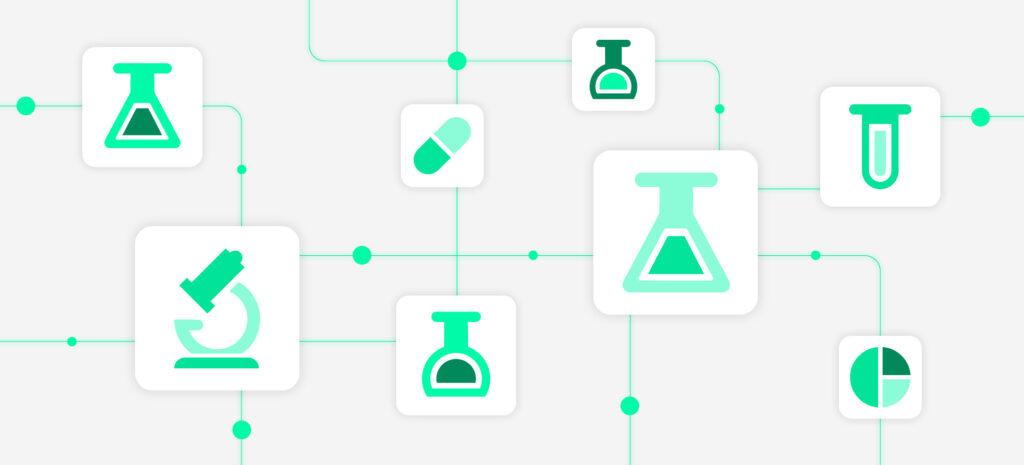In the first part of our blog series on artificial intelligence in life science, we explored how AI impacts the drug development process – and what this might mean for the industry’s future. This time, we will drill down into a key component of drug development – the clinical trial process – to discuss how AI is revolutionizing how new treatments, drugs, and devices are tested and evaluated.
Why AI?
The clinical trial process has gone largely unchanged for decades. It’s a tried-and-tested means of ensuring that the drugs made to market are as safe and effective as possible. But while clinical trials are largely effective, they come with a very high attrition rate. The latest estimates from MIT suggest that just 14% of all drugs in clinical trials ultimately earn FDA approval. There remains significant scope to reduce the cost, complexity, and inefficiency of the clinical trial process while maintaining trial integrity and the safety of subjects.
AI is already making significant strides in this space. Applications such as machine learning, deep learning, and natural language processing promise to make clinical trials faster, more efficient, and less expensive – and to put patient engagement at the heart of the trial process. AI also has great potential to increase the probability of approval, and ultimately improve patient outcomes.
Machine learning has the potential to help improve the success, generalizability, patient-centeredness, and efficiency of clinical trials. – Trials Journal
Let’s explore how AI is currently being applied across the clinical trial process and what we can expect to see in the future.
Current AI applications in clinical trials
Identifying patient populations
Poor clinical trial recruitment is one of the most common reasons trials fail. Identifying and engaging a population of eligible patients, ensuring clinical trial diversity, and achieving an adequate sample size can all be significant stumbling blocks.
According to the National Center for Biotechnology Information, AI can help to ‘reduce population heterogeneity’ by parsing diverse EMR data to select patients with a ‘higher probability of measurable clinical endpoints’ and using machine learning to look for key biomarkers. In this way, AI is helping HCPs select populations that stand a better chance of responding to treatment.
Replacing placebo control groups
Some AI startups have been using AI to build ‘digital twins’ of subjects for randomized clinical trials. These digital twins mirror real RCT subjects, allowing clinical teams to reduce the size of their control groups while still producing evidence that’s equally valuable. This application is easing the burden of trial recruitment and minimizing patient disruption.
Improving study efficiency
Life science companies currently have access to reams of structured and unstructured real-world data. AI applications can help to clean, aggregate, store, and manage this data – giving clinical teams the insights to inform better site selection, optimize study designs, accelerate the informed consent process and more.
“When asked what technologies would have the most impact improving clinical trial efficiency, the top answer from survey respondents was leveraging big data and AI.” – Icon
Replacing animal testing and accelerating the preclinical phase
Given enough data, predictive AI models can be used to calculate the results of a given treatment on a subject or group of subjects. While ‘digital twins’ are being used to populate placebo control groups with virtual subjects, a similar approach is being used to remove the need for animal models in the preclinical phase – accelerating the clinical trial process without putting subjects at unnecessary risk.
Wearable technology and patient monitoring
AI-powered wearable tech already has numerous commercial applications, from smartwatches to health and activity trackers like Fitbit. Similar patient monitoring devices are proving invaluable to clinicians too, with machine learning enabling ‘automatic detection of physical and emotional states, according to the National Center for Biotechnology Information. These technologies provide reliable data on whether patients are on-site, helping enable decentralized clinical trials.
The future of AI in clinical trials
Predicting the future of artificial intelligence, machine learning, and other applications in life science is a notoriously tricky and subjective exercise. Some commentators expect AI and machine learning to fundamentally transform every aspect of the pharma industry, medicine, and healthcare, while others are more guarded in their predictions.
“We’re just seeing the tip of the iceberg for the potential and eventual uses of AI in clinical trials and drug development,” says Wout Brusselaers in Clinical Trials Arena. “I believe AI will continue to bring much greater precision to each process step. Soon many isolated, manual processes, driven by habit rather than by data, will be radically overhauled.”
“Both operational and philosophical barriers limit the harnessing of the full potential of ML for clinical research. ML in clinical research is a high-risk proposition due to the potential to propagate errors or biases.” – Trials Journal
Whether AI and machine learning will lead to a revolution or merely an evolution of the clinical trial process, it’s impossible to say for sure. Either way, AI applications are becoming increasingly important to the way life science companies operate. By using AI-enabled insights management platforms, life science teams can unlock crucial insights from HCP meetings, including key concepts, sentiments, and trends – potentially leading to new market opportunities and better-informed business decisions. The time to embrace AI is now.
Curious about how AI applications are being used elsewhere in the drug development process? Read the first blog in our series.






